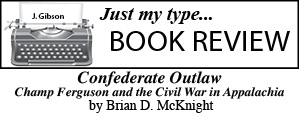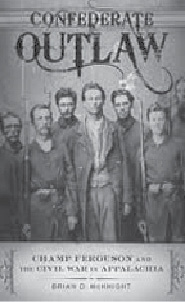Confederate Outlaw

Champ Ferguson and the Civil War in Appalachia
by Brian D. McKnight
Since I am “not from around here” I had never heard of Champ Ferguson until my family settled in Albany in the early 70s. As I was hearing him mentioned, then and for many years later, he was described as a “hero” during the Civil War, somewhat of a self-appointed Wyatt Earp.
That scenario, however, is probably the farthest from the truth.
Confederate Outlaw: Champ Ferguson and the Civil War in Appalachia by Brian D. McKnight is probably the best documentation of the exploits of this Civil War hooligan that has been published. In McKnight’s book, every rumor, story, fact or fiction is researched to the hilt, bringing the story of this troubled Clinton Countian to its real truth.
Champ Ferguson was born in Clinton County in 1821. By 1850, the 29-year-old had become a substantial farmer and owned three slaves. Then, in the last part of the 1850s, an economic dispute with Floyd Evans of Livingston, Tennessee grew into a feud in which Ferguson killed a Tennessee county constable.
From that point on, Ferguson spiraled downward.
Maybe early in the fight, Ferguson was just a farmer protecting his land and his family. But it seems as the war escalated, so did Ferguson’s feeling of paranoia. In the early stages of the Civil War, it seems he thought of himself as the only man who knew what was best for this area on the Kentucky – Tennessee border.
This region was divided between Unionists and Confederate sympathizers. Soon friends, neighbors, brothers, and sons were at war with each other. Clinton County was Unionist, but the surrounding areas were Confederates, with dastardly deeds being initiated by both sides.
Both sides reported the ruthlessness of the other, and soon it was hard to distinguish the good from the bad. In this area, it became hard to know who you could trust.
During this time, Ferguson killed just to be killing it seemed. He justified his killings by believing every man he killed would have eventually come back and killed him. He would just do it first. There was a war on after all. He seemed to have a justification for every nasty deed he executed.
This book chronicles the life Ferguson led mainly during 1861 to 1865. Ferguson doesn’t seem to belong on either side as he travels between Clinton County and parts of Tennessee, seeing his survival as his only mission. His loyalty was only to himself.
After claiming the lives of 53 men officially and the rumors of dozens more during the war, Ferguson was reported to Union authorities for performing outrages against Unionists. He was hunted, captured, and put on military trial in Nashville, Tennessee. Probably no other single participant in the war could claim a more bloody career as that of Ferguson.
The story of his final hours is truly interesting in itself as Ferguson listens to his charges read, but still has in his mind that he was justified in every instance. He was reportedly arrogant and unremorseful and callously commented about one of the killings that “I could tell it better than that.”
After his hanging, rumors that Ferguson had escaped the gallows were widespread, but McKnight has documentation that the rumors were not true.
Ferguson was hanged on October 20, 1895. He is buried in Pall Mall, Tennessee.
Brian McKnight is an Associate Professor of History and has a Ph.D. from Mississippi State, an M.A. from East Tennessee State, and a B.A. from University of Virginia’s College at Wise. He is a military historian with a great desire to preserve the memory of regional historical resources, encouraging the appreciation of local history.
The book is available at book stores and on-line.

